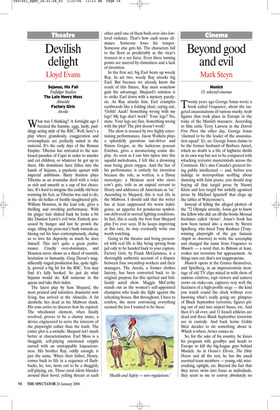Devilish delight
Lloyd Evans
Sejanus, His Fall Trafalgar Studios The Late Henry Moss Almeida Factory Girls Arcola What was I thinking? A fortnight ago I berated the hammy, eggy, lardy, puddingy acting style of the RSC. Well, here’s a play where grandiosity, exaggeration and overemphasis are perfectly suited to the material. It’s the early days of the Roman Empire. Tiberius has retreated to the sunkissed paradise of Capri in order to murder and eat children, or whatever he got up to there. His dominions have fallen into the hands of Sejanus, a psychotic upstart with imperial ambitions. Barry Stanton plays Tiberius as an avuncular devil with a voice as rich and smooth as a cup of hot chocolate. It’s hard to imagine this cuddly old bear warming his feet, as Tiberius was said to do, in the slit bellies of freshly slaughtered girls. William Houston, in the lead role, gives a thrilling and revolting performance. With his ginger hair slicked back he looks a bit like Damien Lewis’s evil twin. Entirely possessed by hunger and lust he prowls the stage, tilting his porn-star’s body towards us, hissing out his lines contemptuously, daring us to love his depravity as much he does himself. This isn’t quite a great performance. Cruelty over-dominates, and Houston never shows us a shred of warmth, hesitation or humanity. Greg Doran’s magnificently staged production has, quite rightly, proved a big hit for the RSC. You may find it’s fully booked. So just do what Sejanus would do. Kill someone in the queue and take their ticket.
The latest play by Sam Shepard, the most praised and talentless dramatist now living, has arrived at the Almeida. A fat alcoholic lies dead in his Midwest shack. His sons arrive to discover how he expired. The whodunnit element, when finally resolved, proves to be a clumsy snare, a device engineered to serve the interests of the playwright rather than the truth. The entire plot is a swindle. Shepard isn’t much better at characterisation. Earl Moss is a thuggish, self-pitying emotional cripple cursed with an unstoppable loquaciousness. His brother Ray, oddly enough, is just the same. When their father, Henry, comes back to life in a sequence of flashbacks, he, too, turns out to be a thuggish, self-pitying, etc. These rural idiots blunder around their hovel, yelling threats at each other until one of them boils over into lowlevel violence. That’s how each scene climaxes. Someone loses his temper. Someone else gets hit. The characters fall to the floor as predictably as the vicar’s trousers in a sex farce. Even these turning points are marred by clumsiness and a lack of invention.
In the first act, big Earl beats up weedy Ray. In act two, weedy Ray attacks big Earl. But because we already know the result of this fixture, Ray must somehow gain the advantage. Shepard’s solution is to strike Earl down with a mystery paralysis. As Ray attacks him, Earl crumples earthwards like a folding chair, crying out, ‘Oohh! Aaah! Something wrong with my legs! My legs don’t work!’ Your legs? No, mate. Your legs are fine. Something wrong with the plot! The plot doesn’t work!
The show is rescued by two highly entertaining performances. Jason Watkins plays a splendidly garrulous taxi-driver and Simon Gregor, as the ludicrous peasant Esteban, gives a mesmerising comic display. As soon as I saw him tiptoe into this squalid melodrama, I felt like a drowning man being given oxygen. And the fun of his performance is entirely his invention because the role, as written, is a flimsy stereotype: a Mexican nerd who stews cow’s guts, toils as an unpaid servant to Henry and addresses all Americans as ‘sir.’ According to Shepard, this is real life in the Midwest. I should add that the writer has at least suppressed his worst indulgence, an appetite for ponderous symbolism delivered in surreal lighting conditions. In fact, this is easily the best Sam Shepard play I’ve ever seen. If he keeps improving at this rate, he may eventually write one worth watching.
Going to the theatre and being presented with real life is like being sprung from jail only to be handed back to your captors. Factory Girls, by Frank McGuinness, is a thoroughly authentic account of a dispute between four sweatshop workers and their managers. The Arcola, a former clothes factory, has been converted back to its original purpose for this spirited and brilliantly acted show. Maggie McCarthy stands out as the women’s self-appointed champion who leads the fight against the scheming bosses. But throughout, I have to confess, the more convincing everything seemed the less I wanted to be there.






















































 Previous page
Previous page